I was born in Chicago, Illinois, 6 March 1929, to Arthur John and Lillian (O'Keefe) Harris; brought up at Lake Ann, Benzie County, Michigan. Attended one room school houses, until entering Honor Rural Agricultural School where Thelma Swiler and Miss Burke were my favorite and most influential teachers; graduated from Traverse City High School, 1947, where Miss Pagel (of English) and Miss Kennedy, for her direction of Arsenic and Old Lace, were my most influential.
Graduated from
Central Michigan University, 1951, with Bachelor of
Science
Degree, Major Biology, Minors History and English, where Dr. Olive
Hutchinson Krees and Dr. Mary Mathison Wills were most
influential. Ultimately, it was Mrs. Wills who advised me to "get
on the boat" (for England) as soon as possible. High School English
Teacher, Reed City, Michigan, 1951-54. Previously, two ten week summer
sessions of graduate study in English Literature,
University of Colorado, brought my hours in English up to a
major. It also gave me the opportunity to perform in
Twelfth
Night
under the direction of
B. Iden Payne,
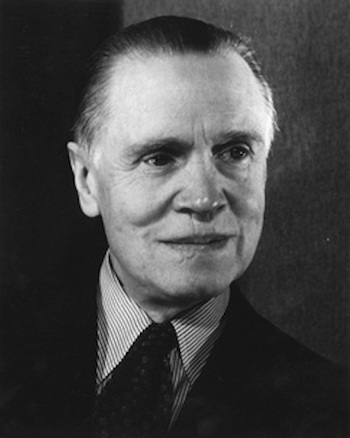
B. Iden Payne,
World-Renowned Teacher and Director of Shakespeare
formerly director of The
Memorial Theatre (now "Royal") at Stratford-upon-Avon. Awarded a
Ford Foundation Fellowship for High School Teachers
in 1954 and traveled in Great Britain (where I first went to the
Edinburgh Festival, at which I saw a great exhibition of the works
of Diaghilev. I first traveled through Scotland (as far as the
Outer Hebrides), and down through the Lake District, York, the Bronte
Country, etc., all the while visiting schools, studying their drama
programs. Late in 1954, I began studying at The Shakespeare
Institute, University of Birmingham, at Stratford, 1954-56, under the
direction of Professor Allardyce Nicoll.
I completed my M.A. thesis there under the direction of
R. H. Hill
on a stage history of
Measure
for
Measure 1959.
Returned
to America, 1956, to teach at Arthur Hill High School,
Saginaw, Michigan, 1956-59. While there, I produced the first act of
Hamlet
as an experiment (later presented before the entire student body)
and later mounted a full-scale production of
Twelfth
Night
for the public with important assistance in costumes and
sets from Constance Bassil. From 1959 to 61, I was Instructor in
English at Central Michigan University. In 1961, I returned
to the Institute at Stratford to begin work on the Ph.D., this time
focusing on the dissertation,
"King
Lear in the Theatre: A
Study of the play Through the Performances
of Garrick, Kean, Macready, Irving,
Gielgud, and Scofield" under the direction of
John Russell Brown:
Ph.D. granted in 1966.
Those first two study periods ('54-'56 and '61-'63) at Stratford were
perhaps the most influential of my life, not only because I was a
graduate student among such important scholars in a small and very
historic setting, but also because I was able to experience world
famous theatre
Laurence Olivier's 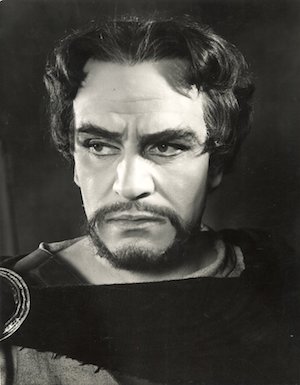
Laurence Olivier
as Macbeth 1955
photo by Angus Mcbean
Macbeth,
Paul Scofield's 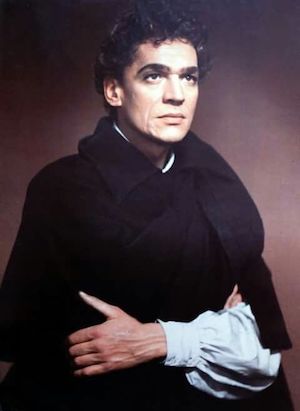
Paul Scofield As Hamlet in 1955
Hamlet,
John Gielgud's 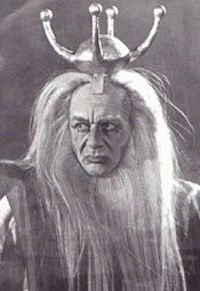
John Gielgud As King Lear in 1955
King
Lear and
Much Ado (with Peggy
Ashcroft) to mention only a very few. In England at that time you
had closer contact with the actors and I later spent one year living in
a thatched cottage on the Village Green, Luddington outside Stratford
in the "digs" where Scofield had lived as he rose to fame. One was
always in the presence of great actors: Edith Evans often had
lunch at Hall's Croft, Shakespeare's daughter's home, with students
in the club room of the house. I think, too, that perhaps I am
the only person in the world who saw Olivier's
Macbeth
13 times over a long season and my hair stood on my arms
every time I saw it. His performance of
Titus Andronicus 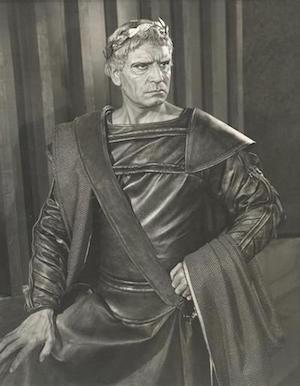
Laurence Olivier As Titus Andronicus in 1955
in Peter Brooks'
production was also indelibly planted in my memory.
In 1963, I took a position as Instructor of English at The University of Michigan, later Assistant Professor, until 1967, when I settled at Eastern Michigan University, for the remainder of my academic career, teaching both undergraduate and graduate courses in Shakespeare, as well as graduate Whitman and Dickinson, retiring as Full Professor at 65 in 1994. I took students several times to productions at Stratford, Ontario. In 1974, '76, and '78, I led students to The Shakespeare Institute for a spring course in "Shakespeare and the Shakespeare Country." In 1988, I also participated in an exchange program with Nonnington College in Kent, Fall Semester, 1984.
Publications include
"William Poel's Elizabethan Stage: The First Experiment,"
Theatre
Notebook,
Summer, 1963, inwhich I revealed the full description of Poel's famous
Elizabethan stage for the first time;
"Garrick, Colman, and
King
Lear:
A reconsideration,"
Shakespeare
Quarterly, Winter,1971,
in which I proved that, contrary to popular belief, Garrick was
not the foremost restorer of Shakespeare's text to the stage after the
alterations of Naham Tate. Instead, it was George Colman, his
contemporary man of the theatre. (This does not diminish
Garrick's genius
as an actor or his status as probably the greatest promoter of
Shakespeare in the
theatre.) This essay has been more recently republished in
volume 9 of Steven Orgel's reprints of classic essays of the 20th
century;
"William Poel's Measure
for Measure
at Stratford-upon-Avon,1908,"
Speech
and
Drama,
vol. 37, no. 1,1988, in which I develop a full-length study
of one of Poel's most significant productions;
"Ophelia's 'Nothing': "It Is the False Steward that Stole His
Master's Daughter,"
Hamlet
Studies,
1997, in which I present a strong argument for my theory that King Claudius
abused and later destroyed Ophelia. The evidence is particularly
revealed in the crux line she herself speaks to her brother (IV.v.):
"It is the false steward that stole the master's daughter." Reverse the
line and you get: "It the false master [Claudius] that stole the
steward's [Polonius] daughter." Laertes' own following line reveals the
importance of it: "This nothing's more than matter," and, at the outset
of the scene, in her madness she is said to speak
"half-sense", but there is also significant evidence throughout the
play. Remember,
Hamlet
is a play about characters who are suspicious, uncertain. So too
should be the audience; we may never know for certain the truth of my
theory, but we should be at least highly suspicious about what happens
to Ophelia.
Most recently, in a note in
The
Explicator
(Winter 2004), Frankie Rubinstein and I collaborate to prove that the
crux line in
The
Merchant
of
Venice,
"And if on earth hedoe not meane it, it/Is reason he should
never come to heaven" (3.5.8.) should follow the three early
texts and stick to Shakespeare's "mean", not Alexander Pope's
changing of "mean" to "merit", as do the
majority of modern editions, the problem being that editors
have often missed the bawdy in the scene and they often seem not
to know that the first definition of
'meane' in the Middle English Dictionary is "sexual intercourse."
Another essay by us
on Jessica and her importance to the play at large appeared
in December 2004 in
English
Language
Notes.
It will help readers to see her role more clearly and encourage
directors not to cut this small but important scene from their productions.
Research Presentations include:
"Who Killed Ophelia?", the annual meeting
of the Michigan Academy, Central Michigan University, March, 1977;
"'A
Tricksy Word': The Meaning of Jessica's 'Meane'," The Poetry, Drama,
and Prose of the Renaissance and Middle Ages, at The Citadel,
Charleston,
South Carolina, 1991;
"Hearing Ophelia: 'It is the false steward that stole his master's daughter'" at a Renaissance dinner before the Book Club of Detroit, The Scarab Club, Detroit, Michigan, December 7, 1999.
Particularly since 1974, I have coupled this literary and academic career with devotion and commitment to historic preservation in the community of Ypsilanti, Michigan.